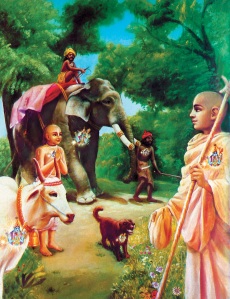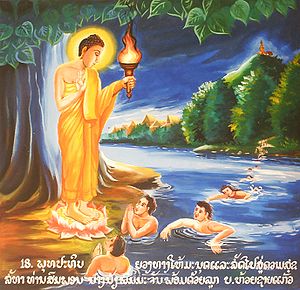The Hindu concept of the ubiquitous presence of the Universal Essence, as souls in every individual, generated the idea of 'Same - sightedness' (Sama Darshinah in Sanskrit) - seeing the same essence in the highest and the lowest in creation - a democracy of the spirit. The Gita underlines this concept thus:
'' Men of self-knowledge see the Eternal equally in a wise and courteous Brahmin (man of learning), a cow, an elephant, a dog and an outcast.''
One then sees that the Divine essence is in all, and all are in it. This supreme egalitarianism becomes possible because the essence of the creator is present in every minute atom of his material creation.
This sense of the universal presence of divinity is further explained in the Gita in the following verses:
''He who sees me everywhere and sees all in me, he never becomes lost to me, nor do I become lost to him.''
''He who established in oneness, worships me abiding in all beings, that yogi lives in me....''
Such a mind-set creates the right attitude for engaging in the welfare of all, a humanitarianism which is concerned for the well-being not only of mankind but of the animal world as well and beyond to inanimate objects comprising nature (equally imbued with divinity) - an attitude that would encourage the environmental consciousness of today.
The placing of a vermillion dot or mark on the forehead at religious ceremonies among Hindus and by women as a cosmetic adornment, become a daily reminder of the existence of the soul within. The vermillion mark indicates the location of the seat of the soul.
The presence of the soul as a divine fragment in every individual is further highlighted through the customary Indian salutation and greeting of one another with folded hands. People often wonder why Indian culture has adopted this mode of greeting which elsewhere is reserved for prayer in places of worship. The salutation with folded hands is not to the ego-personality you happen to meet but to his soul, the divinity within him. That explains why it looks more like a gesture of prayer than a greeting.
Likewise in Hindu temples the priest after worshipping the deity on the altar with waving wicker lamps turns to the gathering of worshippers and waves the light at them in a second gesture of worship. Here he is acknowledging the divinity within the gathered congregation. God is both on his high altar as the worshipped and in the congregation as the worshippers.
Indian culture employs these varied devices, cosmetic, religious and through the mode of greeting, to underline the presence of divinity within every individual.





.jpg)


